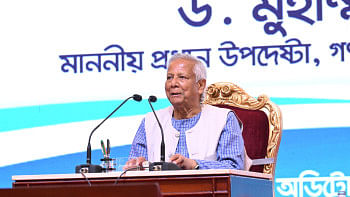Victims' Families Unhappy
Though families of those killed by Alim and his men in Joypurhat in 1971 are disappointed that the war criminal has not been condemned to death, there's a sense of relief that he has at last been brought to justice. Tamanna Khan and Kongkon Karmaker talked to them for their reactions.
 Abdul Hye
Abdul Hye
Abdul Hye, 64, had seen his brother Fazlul Karim get killed by Alim and his accomplices during the Liberation War.
He yesterday lamented that his mother, who died in 2011, could not see the justice done.
"She used to ask me if there would ever be a trial. I used to assure her that justice would be served and this is the law of the nature, of the Almighty."
Alim was awarded imprisonment till death for four crimes against humanity, one of which is killing Fazlul Karim along with two other freedom fighters.
Hye, himself a freedom fighter, had testified as a prosecution witness in the war crimes case against Alim.
Though he was not satisfied with the verdict, he was still happy to see Alim being punished.
"The younger generations will at least know what we have gone through."
Hye urged the government to appeal against the verdict in the Supreme Court.
 Kazi Ezaz Ahmed
Kazi Ezaz Ahmed
Kazi Ezaz Ahmed, one of the grandchildren of Abdul Kashem and a prosecution witness, remained silent for a couple of minutes after he heard the news of the verdict.
"Maybe they [the judges of the tribunal] have considered his [Alim] health and given him the sentence.
"Whatever... it is we who should be glad that a judgment has finally been handed down to him [Alim] after 42 years of the incident."
Ezaz was a 12-year-old child when he witnessed the abduction of his grandfather Kashem.
 Bhanubhusan Chakraborty
Bhanubhusan Chakraborty
He was only six when he lost his father Monibhusan Chakraborty.
Monibhusan along with nine other Hindus from Uttar Hatsahar and Harunja Hat villages of Joypurhat was dragged out of their houses and killed by the Pakistan army at the instigation of Alim.
"I remember Baba [father] but most of my memories of him are hazy," Bhabubhusan said.
He and his three other siblings waited 42 years to see the man, who had taken away their father from them for good, punished.
The judges of the International Crimes Tribunal awarded Alim a jail-unto-death sentence, considering his old age and ailment but "Alim did not show any consideration when my father was taken away and killed”.
Bhanubhusan, however, said, "We have to accept the judgment delivered by the honorable tribunal. But he (Alim) did not get the capital punishment he deserved.
"The judges themselves said he [Alim] deserved the capital punishment for the heinous crimes he had committed."
He is hopeful that the government will challenge the verdict in the Supreme Court.
"Before this trial began, the war criminals had this notion that nothing would ever happen to them. Now it is proved that a criminal cannot elude justice," he noted.
DILIP CHARABORTY
"A life for a life should have been the right sentence," said Monibhusan's nephew Dilip. Hiding in the bush, he had witnessed how Alim's men took away Hindus, including Monibhusan, to Khetlal Police Station from where they never returned.
Dilip, 59, a primary school teacher in Joypurhat, had testified against Alim in the court.
"The learned tribunal awarded him imprisonment till death. We have no other choice but to accept it," he said.
Instead of getting punished, the war criminals had roamed around the very land whose liberation they opposed while the children of those who were killed in 1971 suffered, Dilip said.
"No one tried to understand their pain. The fact that the perpetrators are being tried at last provides some sort of solace. "
LAILY BEGUM
"I am not happy with the verdict," Laily said.
The 64-year old can clearly remember how her father Abdul Kashem was taken away by the Pakistan army and local Razakars in the early hours of July 24, 1971.
She was the 12th prosecution witness in the Alim's case. The defence could not shake her testimony a bit during the cross examination, according to the judgment.
"I am hundred percent certain that Alim is responsible for my father's killing."
Laily, her brother and uncles had pleaded with Alim's men not to take her father away but in vain.
Forty-two years later, Alim was sentenced to 20 years in jail for his involvement in the killing of Abdul Kashem.

 For all latest news, follow The Daily Star's Google News channel.
For all latest news, follow The Daily Star's Google News channel. 



Comments